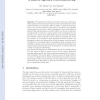Free Online Productivity Tools
i2Speak
i2Symbol
i2OCR
iTex2Img
iWeb2Print
iWeb2Shot
i2Type
iPdf2Split
iPdf2Merge
i2Bopomofo
i2Arabic
i2Style
i2Image
i2PDF
iLatex2Rtf
Sci2ools
131
click to vote
DIS
2009
Springer
2009
Springer
A Dialectic Approach to Problem-Solving
We analyze the dynamics of problem-solving in a framework which captures two key features of that activity. The first feature is that problem-solving is a social game where a number of problem-solvers interact, rely on other agents to tackle parts of a problem, and regularly communicate the outcomes of their investigations. The second feature is that problem-solving requires a careful control over the set of hypotheses that might be needed at various stages of the investigation for the problem to be solved; more particularly, that any incorrect hypothesis be eventually refuted in the face of some evidence: all agents can expect such evidence to be brought to their knowledge whenever it holds. Our presentation uses a very general form of logic programs, viewed as sets of rules that can be activated and fire, depending on what a problem-solver is willing to explore, what a problem-solver is willing to hypothesize, and what a problem-solver knows about the problem to be solved in the fo...
Related Content
| Added | 26 May 2010 |
| Updated | 26 May 2010 |
| Type | Conference |
| Year | 2009 |
| Where | DIS |
| Authors | Éric Martin, Jean Sallantin |
Comments (0)

